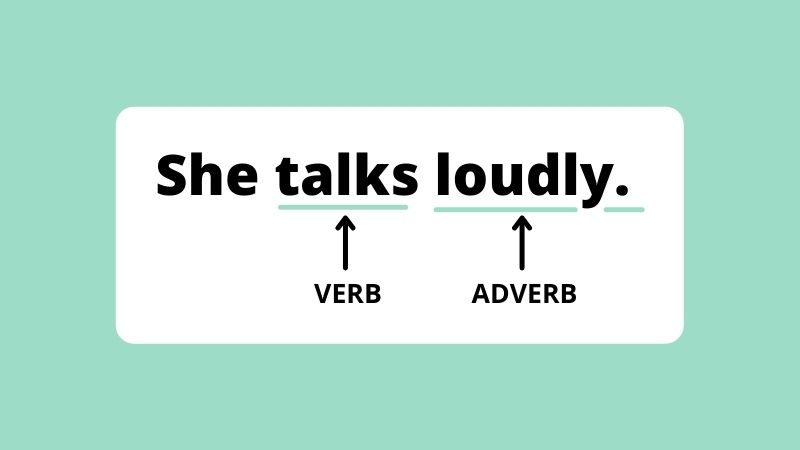What is an Adverb?
To put it out in simple words, it is a word that describes verbs. Well, it is also used to add or modify the meaning of an adjective, a verb, a preposition, a sentence, or a clause.
Adverbs are a part of speech particularly used to express the manner, time, place, frequency, degree, and much more about a verb.
You’ll probably be knowing that words like quickly, everywhere, and extremely are examples of adverbs. But are you aware of different types of adverbs?
Here in this article, you’ll likely end up incorporating a meaningful amount of information about Adverbs.
So without any further ado, let’s explore the sphere of ‘’Adverbs.’’
| Related | List of Adjectives: 300+ Adjectives |
1. What are Adverbs?
Adverbs are words that come with the ability to modify a verb, an adjective, a clause or another adverb. Most adverbs end with “-ly.”

For example:
- She talks loudly. (Here, “talks” is the verb, and the adverb “loudly” is describing how the verb is done.)
- She runs swiftly. (Here, the adverb “swiftly” modifies the verb “runs.”)
An adverb while modifying a verb tells us how, when, where, why, how often, or how much a particular action is performed. For instance,
- How: She ran quickly.
- When: She ran yesterday.
- Where: She ran here.
- How often: She ran daily.
- How much: She ran steadily.
2. Types of Adverbs
Just like any other parts of speech, there are several types of adverbs too. Adverbs are usually categorized by the nature of questions they answer or the kind of information they provide.
Here, we’ll be discussing about nine common types of adverbs:
- Conjunctive adverbs
- Adverbs of frequency
- Adverbs of time
- Adverbs of manner
- Adverbs of degree
- Adverbs of place
- Adverb of Reason
- Interrogative Adverbs
- Relative Adverbs
1. Conjunctive adverbs
As the name says, a conjunctive adverb is an adverb that acts like a conjunction and works by connecting two clauses or two sentences together.
Some examples of conjunctive adverbs are: accordingly, also, besides, consequently, finally, however, indeed, instead, likewise, meanwhile, moreover, nevertheless, next, otherwise, still, therefore, then, etc.
While using a conjunctive adverb, put a semicolon (;) before it and a comma (,) after it.
Examples in the form of sentence:
- The baby fell asleep; then, the door opened.
- There are many history books; however, not all of them may be accurate.
- We have many different sizes of this shirt; however, it is available in only one color.
Conjunctive adverbs are slightly similar to coordinating conjunctions (and, but, or, so, for, yet, nor); but the only difference is that they are punctuated differently.
2. Adverbs of frequency
Adverbs of frequency tell us how often an activity happens, it shows the frequency with which the task needs to be completed.
Examples:
- My friend often forgets my birthday.
- She sometimes wakes up early.
- Jimmy never drinks coffee in the evening.
3. Adverbs of time
Adverbs of time tell us when an action happened, it indicates the time or moment of doing a task.
Examples:
- Jenny went to Jim’s house yesterday.
- I’m going to clean my room tomorrow.
- I saw Tim today.
- I will call you later.
4. Adverbs of manner
Adverbs of manner tell us about the manner of an action, it adds information regarding ‘how’ or ‘in what way’ in a sentence.
Examples:
- She always keeps himself busy.
- He does not talk loudly to elderly people.
- Megha always behaves gently with her elders.
- She opened the door hurriedly.
5. Adverbs of degree
Adverbs of degree tell us about the intensity of a particular thing.
It answers the questions stating ‘how much‘ or ‘to what degree or extent‘ and thereby is used to show the degree or extent to which the task has been done.
Examples:
- The water was extremely hot.
- The script is quite interesting.
- He was walking too slowly.
- He has almost finished.
- 6. Adverbs of place
Adverbs of place tell us where something happens, it shows the place where the task is being done or has to be done.
Examples:
- She is going back to school.
- They built a house nearby.
- Neha took the child outside.
7. Adverb of Reason
Adverbs of Reason tell the reason behind the happening of a particular occurrence.
They are often referred to as Adverbs of Purpose. examples of the Adverbs of reason are – therefore, hence, because, so, etc.
Examples in the form of sentence:
- I was hungry so I ate a burger.
- It was raining heavily; therefore, I stayed in the house.
8. Interrogative Adverbs
The interrogative adverbs are “why,” “where,” “when,” and “how.” They are placed at the beginning of a sentence.
Examples:
- Where is your sister?
- When are you going to study?
- Why is your room such a mess?
9. Relative Adverbs
Relative Adverbs are used to relate or connect/join any two sentences, they are just three in particular- where, when, and why.
- I know the town where you live.
- They’re talking about an era when a promise was a promise.
- This is the reason why I left.
3. List of Adverbs
Adverbs that start with A
- abnormally
- absentmindedly
- accidentally
- actually
- adventurously
- afterwards
- almost
- always
- annually
- anxiously
- arrogantly
- awkwardly
Adverbs that start with B
- bashfully
- beautifully
- bitterly
- bleakly
- blindly
- blissfully
- boastfully
- boldly
- bravely
- briefly
- brightly
- briskly
- broadly
- busily
Adverbs that start with C
- calmly
- carefully
- carelessly
- cautiously
- certainly
- cheerfully
- clearly
- cleverly
- closely
- coaxingly
- colorfully
- commonly
- continually
- coolly
- correctly
- courageously
- crossly
- cruelly
- curiously
Adverbs that start with D
- diligently
- dimly
- doubtfully
- dreamily
- daily
- daintily
- dearly
- deceivingly
- deeply
- defiantly
- deliberately
- delightfully
Adverbs that start with E
- easily
- elegantly
- energetically
- enormously
- enthusiastically
- equally
- especially
- even
- evenly
- eventually
- exactly
- excitedly
- extremely
Adverbs that start with F
- fairly
- faithfully
- famously
- far
- fast
- fatally
- ferociously
- fervently
- fiercely
- fondly
- foolishly
- fortunately
- frankly
- frantically
- freely
- frenetically
- frightfully
- fully
- furiously
Adverbs that start with G
- generally
- generously
- gently
- gladly
- gleefully
- gracefully
- gratefully
- greatly
- greedily
Adverbs that start with H
- happily
- hastily
- healthily
- heavily
- helpfully
- helplessly
- highly
- honestly
- hopelessly
- hourly
- hungrily
Adverbs that start with I
- immediately
- innocently
- inquisitively
- instantly
- intensely
- intently
- interestingly
- inwardly
- irritably
Adverbs that start with J
- jaggedly
- jealously
- jovially
- joyfully
- joyously
- jubilantly
- judgmentally
- justly
Adverbs that start with K
- keenly
- kiddingly
- kindheartedly
- kindly
- knavishly
- knowingly
- knowledgeably
- kookily
Adverbs that start with L
- lazily
- lightly
- likely
- limply
- lively
- loftily
- longingly
- loosely
- loudly
- lovingly
- loyally
Adverbs that start with M
- madly
- majestically
- meaningfully
- mechanically
- merrily
- miserably
- mockingly
- monthly
- more
- mortally
- mostly
- mysteriously
Adverbs that start with N
- naturally
- nearly
- neatly
- nervously
- never
- nicely
- noisily
- not
Adverbs that start with O
- obediently
- obnoxiously
- oddly
- offensively
- officially
- often
- only
- openly
- optimistically
- overconfidently
Adverbs that start with P
- painfully
- partially
- patiently
- perfectly
- physically
- playfully
- politely
- poorly
- positively
- potentially
- powerfully
- promptly
- properly
- punctually
Adverbs that start with Q
- quaintly
- queasily
- queerly
- questionably
- quicker
- quickly
- quietly
- quirkily
- quizzically
Adverbs that start with R
- randomly
- rapidly
- rarely
- readily
- really
- reassuringly
- recklessly
- regularly
- reluctantly
- repeatedly
- reproachfully
- restfully
- righteously
- rightfully
- rigidly
- roughly
- rudely
Adverbs that start with S
- safely
- scarcely
- scarily
- searchingly
- sedately
- seemingly
- seldom
- selfishly
- separately
- seriously
- shakily
- sharply
- sheepishly
- shrilly
- shyly
- silently
- sleepily
- slowly
- smoothly
- softly
- solemnly
- solidly
- sometimes
- soon
- speedily
- stealthily
- sternly
- strictly
- successfully
- suddenly
- supposedly
- surprisingly
- suspiciously
- sweetly
- swiftly
- sympathetically
Adverbs that start with T
- tensely
- terribly
- thankfully
- thoroughly
- thoughtfully
- tightly
- tomorrow
- too
- tremendously
- triumphantly
- truly
- truthfully
Adverbs that start with U
- ultimately
- unabashedly
- unaccountably
- unbearably
- unethically
- unexpectedly
- unfortunately
- unimpressively
- unnaturally
- unnecessarily
- upbeat
- upright
- upside-down
- upward
- urgently
- usefully
- uselessly
- usually
- utterly
Adverbs that start with V
- vacantly
- vaguely
- vainly
- valiantly
- vastly
- verbally
- very
- viciously
- victoriously
- violently
- vivaciously
- voluntarily
Adverbs that start with W
- warmly
- weakly
- wearily
- well
- wetly
- wholly
- wildly
- willfully
- wisely
- woefully
- wonderfully
- worriedly
- wrongly
Adverbs that start with Y
- yawningly
- yearly
- yearningly
- yesterday
- yieldingly
- youthfully
Adverbs that start with Z
- zealously
- zestfully
- zestily





